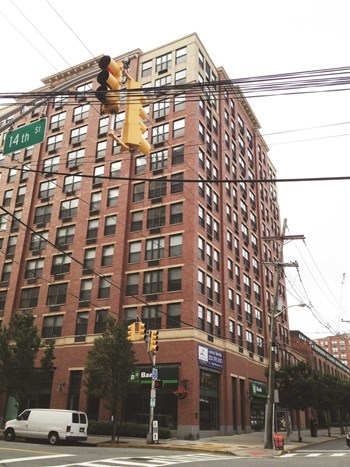
In the typical suburban condo development, one must go to another location to shop— maybe to the mini-mall, or the big box store down the road. But in many of New Jersey’s urban high-rises, retail businesses and stores are often found on the ground floor—supermarkets, restaurants, drugstores, clothing stores and more. Sometimes you’ll even find doctor’s or dentist’s offices.
The relationship between the co-op or condo and the ground-floor business tenant is a complicated one. Having these stores on the ground floor is often seen as a plus by shareholders or unit owners. But for management, it can raise questions. There can be a lot to unpack from the standpoint of insurance, liability, and other concerns.
Desirable and Undesirable
What kind of business is the 'ideal' commercial tenant? Answers vary.
“A commercial tenant who could provide a useful service to the building would be ideal to the residents,” says Chris Cervelli, a portfolio manager with Cervelli Management in North Bergen. “Either a small grocery store, dry cleaning, dog sitting, those are some examples” that come to mind, he says.
“An ideal tenant is someone who will survive in the condominium environment,” says Dolores R. Kelley, an associate attorney with the Lawrenceville office of Stark & Stark. “Depending on the area and neighborhood, if you are in the middle of Hoboken, for example, then tenants who provide personal services such as spas, salons and dry cleaners would be successful. That would benefit everyone because you don't want an empty commercial unit. You want a tenant that will survive and fit well within the community,” says Kelley, who is with Stark & Stark’s Real Estate, Zoning and Land Use practice.
Thomas Onder, a shareholder attorney, also with Stark & Stark, adds that on the litigation side it is crucial for the co-op or condo board and management to ensure that they are well-protected in case the tenant is not successful and goes under. “It is important to make sure that the tenant is vetted properly before there is any sort of lease agreement signed,” he says.
One type of business that can raise a red flag, says Carl Cesarano, CPA, of the Long Island-based accounting firm of Cesarano & Khan, P.C., are bars and restaurants. These establishments can bring crowds, noise, rodents and insects, and cause illuminated signs to shine into residential units. And tenants that use chemicals that could be unsafe, such as dry cleaners, and have other environmental issues “would certainly be less desirable” a tenant to have, Cesarano says.
Many people feel that bars in particular are problematic because they’re open late at night, another factor that could disturb residents. A tenant that produces loud noises or strong offensive smells may not be regarded as the most desirable tenant for an association to lease to, says Cervelli.
Of course, these are not a hard and fast rules—a quick look around most major cities in the Garden State reveals plenty of residential buildings with restaurants or diners on the ground floor. “In many metropolitan areas, tenants such as bars and restaurants are the norm and they are desirable to many residents,” says Kelley.
Onder says that when thinking about the long term, it is important to project how the tenant will impact the building. For example, if the tenant operates a dry cleaning business, “it may be better to have a service that is pick-up only and outsources their service in order to avoid any harmful fumes. The same thing goes for a coffee shop, you might have issues with pests or varmints. It goes into thinking about the health and welfare of the association and what is best for them,” he says. “You also want to consider what the clientele will be, what the hours will be, among others.”
Besides the type of tenant, it is almost very important to consider “how much” of the tenant there will be, meaning what percentage of the condominium space they will occupy. “The Federal Housing Administration (FHA) guidelines only permit up to 25 percent of the entire condominium to be commercial. So if there is more, that might prevent unit owners from being able to obtain an FHA loan. That could be potentially fatal to a condominium because a lot of times new homebuyers are looking at condos and they want to be able to obtain FHA financing and that would be a big hurdle for them,” explains Kelley. “If the association has been existing and the commercial space was already there, they can try converting the commercial space into residential space if possible.”
Brokers add that some tenants are more suitable to residential buildings: banks, for example, and local niche businesses, such as factory outlet designer or a local food grower, which would certainly add to the quality of life in a neighborhood.
What Kind of Insurance?
What kind of insurance do condos and co-ops need if they have commercial tenants? Our experts have several answers.
Edward Mackoul, president of the New York and New Jersey–based insurance firm Mackoul & Associates says, “There is no special insurance the co-op or condominium needs to have, but the commercial space should be required to maintain their own general liability insurance and name the co-op or condominium as an additional insured on their policy. There should be a lease agreement or other contract stating that it is required.”
“Typically the commercial tenant obtains the insurance that complies with the specifications of the co-op/condo’s requirements,” real estate attorney Adam Leitman Bailey, Esq., who heads the law firm Adam Leitman Bailey, P.C., adds. “The co-op/condo requires that it be named in the insurance policy. The co-op/condo requires a certain amount of insurance and specific types of insurance in case of a fire or liability.”
Most brokers require tenants to be fully insured and `hold harmless’ their landlord. `Insurance costs’ can mean all-risk property insurance in an amount of the full replacement cost of the occupied tenant space and its fixtures, comprehensive public liability insurance (in an amount reasonably determined by landlord), rental value (rental loss) insurance (in an amount equal to 100% of the annual base rental and all additional rent for the building) boiler insurance (to the extent applicable) for the building and such other types of insurance as the landlord shall reasonably require.
High-Risk Tenants
How does a higher-risk tenant on the premises, such as a co-op or condo, affect a co-op or condo’s insurance? Several insurance professionals asked by The New Jersey Cooperator replied that a higher-risk tenant may restrict the number of insurance companies who are willing to write the insurance, which will in all probability make the premium higher.
What happens if the co-op or condo building is damaged as a result of a fire or other mishap in the tenant’s business—say, a fire in a restaurant’s ventilation system?
Mackoul says that in such a case, having additional insured status under the tenant’s policy should put the burden of claim on the tenant’s insurance company rather than the building’s insurance company.
Once the Tenant is In
So far, we’ve just talked about the insurance needs of the building or development. But what about the needs of the commercial tenant itself? How is this affected when a business is within a residential building vs. being in its own building or in a commercial strip?
A commercial tenant’s insurance needs changes very little from renting space in an all-commercial building, such as a strip mall, to renting space in a residential building. Indeed, the commercial building or mall may put more demands on the business as far as liability insurance coverage is concerned. Once the commercial tenant is in a residential building, experts say, it’s up to the condo or co-op board or manager to decide the appropriate insurance coverage for that tenant—with the assistance of the insurance broker, attorney and/or management company.
Another important issue is what type of insurance information the business tenant needs to provide to a building’s board and legal professionals before signing a lease.
The board, says Bailey, should ask for a certificate of insurance and the contract demonstrating proof that the amount of coverage the board requires in the lease has been obtained.
“Remember that the carrier may not write the policy until the lease is in place, so careful drafting of the lease will allow the board to terminate the lease for non-compliance,” he says.
Mackoul offers some numbers: “At the very least, they [the commercial business] should maintain general liability in the amount of $1 million per occurrence with a $2 million aggregate.”
The Manager’s Role
In a mixed-use building that contains both resident shareholders/unit owners and commercial tenants, the manager acts as an intermediary between all owners and its tenants, just like he or she does in a totally residential building.
The manager or management company also should be prepared to offer their expertise about insurance, city codes and regulations, alterations and other matters to the commercial tenants, and should always be accessible.
The building manager plays a significant role in making sure the business is operating in a safe manner so losses are minimized. Paperwork must be obtained showing that the correct insurance is in place. Vigilance is maintained in checking on the business as often as possible to correct any problems or stop any inappropriate behavior from continuing.
Most of the time, when the business is a tenant of the condo/co-op building itself, the manager will have to deal with repair issues, rent collections and lease renewals, just like a manager does in a residential rental building. But when a building’s commercial space is owned by another entity, then leased to the store or business, the manager will have less of a role.
It is not to say that all managers will have a heavily-invested relationship with the tenant. “It all depends on how the lease is structured. A manager could have anything from no responsibilities to helping the tenant structure out their space. It really depends,” says Cervelli. “Sometimes the tenant is one hundred percent responsible for all costs and repairs. Sometimes it is the sole responsibility of the landlord. But generally, a property manager will have far less responsibilities managing a commercial unit than managing a residential.”
When Insurance Lapses
Finally, let’s examine what happens if a commercial tenant’s insurance lapses, and then there’s an accident or incident in which the co-op/condo building or its contents are damaged.
Professionals agree that the business’s lease should specify that the business must give notice to the board or managing agent before ending the policy. Bailey says this is usually 30 days, while other professionals recommend a 60-day notice of cancellation.
If there is no current insurance, either the commercial tenant or the building itself may be on the hook for monies due and damages. And when the association or building must deal with the loss, its rates may go up at the next renewal.
For all these reasons, it’s important for the board or management to keep on top of the commercial tenant and to make sure its insurance is up to date and inclusive.
Thankfully, experts—insurance brokers, accountants, attorneys, condo and co-op organizations, and the managers themselves—are available to help buildings and developments deal with their commercial tenants. With the right type of management, a condo or co-op can find that having retail or commercial businesses located right inside their building is a convenience they can’t do without.
“Bottom line, when as association is looking to have a commercial tenant, there has to be a lot of thought as to who the tenant is, what are the liability issues and how it is going to affect the association,” says Onder.
Raanan Geberer is a freelance writer and a frequent contributor to The New Jersey Cooperator. Editorial Assistant Maggie Puniewska contributed to this article.






Leave a Comment